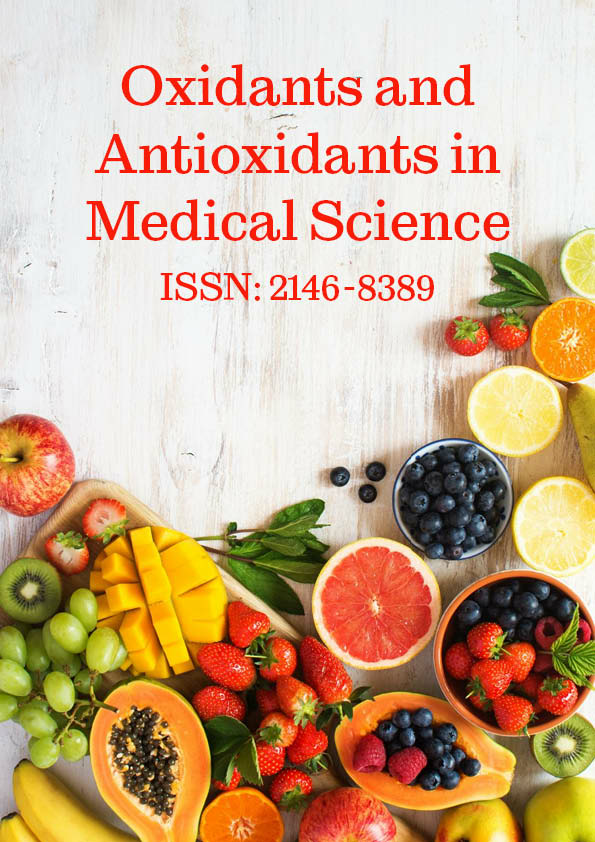Perspective - Oxidants and Antioxidants in Medical Science (2023)
Evaluating the Therapeuic Potenial of Phenolic Compounds in Human Health
Lio Femrna*Lio Femrna, Department of Biochemistry, Adnan Menderes University, Aydin, Turkey, Email: LioFemrna@gmail.com
Received: 14-Sep-2023, Manuscript No. EJMOAMS-23-122713; Editor assigned: 18-Sep-2023, Pre QC No. EJMOAMS-23-122713 (PQ); Reviewed: 20-Sep-2023, QC No. EJMOAMS-23-122713; Revised: 10-Oct-2023, Manuscript No. EJMOAMS-23-122713 (R); Published: 17-Oct-2023
Description
Phenols, a diverse group of organic compounds found abundantly in nature, have emerged as key players in promoting human health. These compounds, characterized by a hydroxyl group attached to an aromatic ring, are widely distributed in plant-based foods and have garnered significant attention for their potential therapeutic effects.
Types of phenols
Phenols encompass a variety of subclasses, each with its unique properties. Flavonoids, a subgroup of phenolic compounds, include flavonols, flavones, and anthocyanins, and are well-known for their antioxidant properties. Other phenols include lignans, stilbenes, and phenolic acids, all contributing to the diverse range of health benefits associated with these compounds.
Health benefits
Antioxidant powerhouse: Phenols are potent antioxidants,helping to combat oxidative stress in the body. Oxidative stress is linked to various chronic diseases, including cardiovascular issues, cancer, and neurodegenerative disorders. The ability of phenols to neutralize free radicals plays a crucial role in maintaining cellular health.
Anti-inflammatory properties: Many phenols exhibit antiinflammatory effects, which can help reduce inflammation in the body. Chronic inflammation is a common denominator in various diseases, and incorporating phenol-rich foods may contribute to mitigating this risk.
Cardiovascular health: The consumption of phenol-richfoods has been associated with improved cardiovascular health. Flavonoids, in particular, have been shown to have positive effects on blood pressure, cholesterol levels, and overall heart function.
Cancer prevention: Some phenols, such as those found in cruciferous vegetables and berries, have demonstrated potential in preventing and slowing the growth of cancer cells. Their antioxidant and anti-inflammatory properties play a crucial role in this aspect.
Food sources of phenols
Fruits and berries: Blueberries, strawberries, cherries,and citrus fruits are rich sources of phenolic compounds, particularly flavonoids. These fruits can be easily incorporated into a balanced diet through snacks, smoothies, or as dessert toppings.
Vegetables: Dark leafy greens, onions, garlic, and cruciferousvegetables like broccoli and kale are excellent sources of phenols. Including a variety of colorful vegetables in your meals ensures a diverse range of phenolic compounds.
Herbs and spices: Herbs and spices such as oregano, thyme,rosemary, and cinnamon contain high concentrations of phenols. Adding these flavourful ingredients to your dishes not only enhances taste but also boosts their nutritional content.
Nuts and seeds: Almonds, walnuts, flaxseeds, and chia seedsare examples of nuts and seeds rich in phenolic compounds. These can be included in breakfast bowls, salads, or enjoyed as a snack.
Tea and coffee: Both green and black tea, as well as coffee,contain phenols. These beverages offer a delightful way to increase your phenol intake while providing hydration.
Phenols, found abundantly in various plant-based foods, play a crucial role in supporting human health. Their antioxidant and anti-inflammatory properties contribute to the prevention of chronic diseases, making them an essential component of a well-balanced diet. By incorporating a variety of phenol-rich foods into our meals, we not only enhance the flavor of our dishes but also invest in our long-term well-being. Embracing the power of phenols is a delicious and nutritious journey towards a healthier life. Phenolic compounds, prevalent in a variety of plant-based foods, present a diverse range of health advantages. Their antioxidative, anti-inflammatory, cardioprotective, and potential anti-cancer properties render them essential components of a well-rounded and healthenhancing diet. By integrating a mix of fruits, vegetables, whole grains, and beverages such as tea and wine, individualscan access a plentiful source of phenolic compounds, contributing to overall health and the prevention of diseases. Ongoing research in this domain is likely to reveal further understanding of the precise mechanisms by which phenolic compounds exert their beneficial impact on human health.







